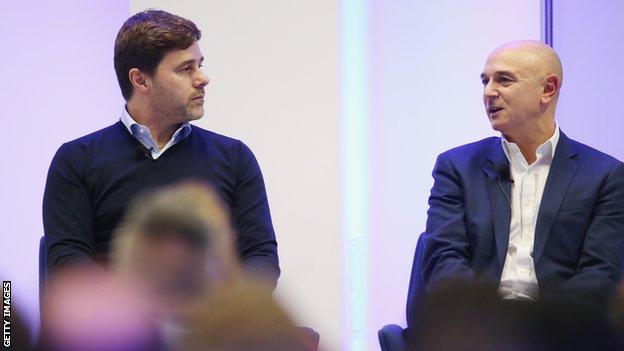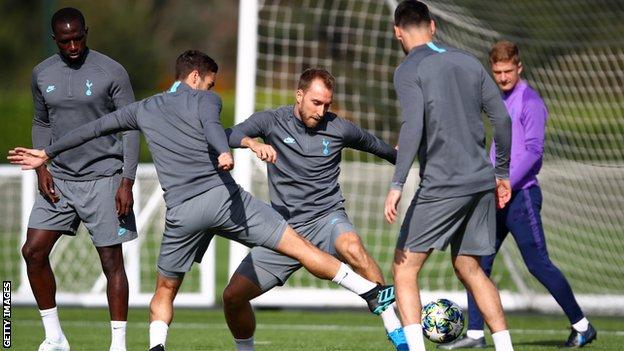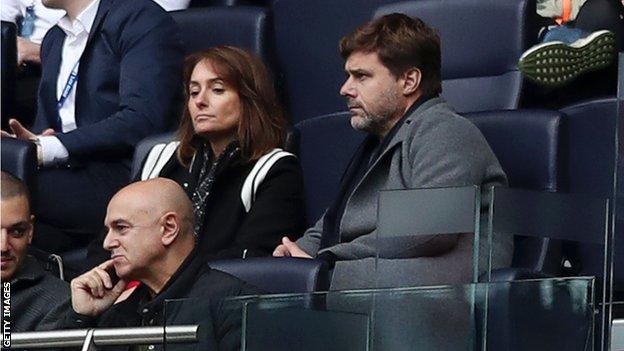Tottenham: Mauricio Pochettino, Daniel Levy and shaping club through 'crisis'
Last updated on .From the section Tottenham


Last year's Champions League campaign hid a lot of cracks in Tottenham's season; this year's has only served to expose them.
Effectively what we are seeing is the irrefutable decay of a squad that should have been recycled, reinvigorated, revitalised, a squad that has been allowed to drift into the footballing crisis it now finds itself in. Why a crisis? Because this team, judging by results, is not moving forward - they are at best standing still and at worst going backwards.
It is a situation that has occurred because different elements of the club have had different views on the strategy and pace needed to move forward. It has meant a lack of decisiveness in the transfer market and, by the time decisions on players have been made, it has often not been possible to implement the moves.
The Pochettino-Levy dynamic
On the one hand you have Mauricio Pochettino, a coach who wants to make his team as good as it can be and to continue winning. On the other you have Daniel Levy, the chairman and a man who analyses the football world inhabited by the top clubs in a different way.
In a nutshell, in Pochettino Spurs have a coach who will look at and evaluate players on the basis of what they can do for the team, while also having one eye on the business. Levy, however, is more likely to view them in terms of what they can do for the business, while having one eye on the football.
In situations such as this, the final decisions will always lie with the chairman.
This has led to scenarios where players have had their contracts renewed with a view to maximising their marketability - selling them on - rather than on the basis of what they might contribute to the team on the field. Or of players signed who were not necessarily what the team needed but were considered a good market bargain.
But nothing is as black and white as it seems. The relationship between the two key men in the club has certainly not broken down.
"People might say that the relationship with the chairman has got worse, but that is not the case," said Pochettino, speaking at a conference in Qatar. "What is important is to maintain the relationship and respect each other. We both need to know how to work our philosophy to be close together.
"In difficult times the manager also has to be up for the fight. I've joked a bit about our big defeats, but we are hurt. It is the time to be genuinely together and to turn things around. Let's put that in our heads and recover."
That is the same message spread out within the club. It is important that everyone, from the chairman to the lowest-profile employee, backs the team.
It is a team, after all, which can beat anyone when on form.
The ultimate test of Pochettino's management
There is no denying Tottenham's heroic Champions League campaign last season - ultimately losing in the final to Liverpool - hid their shortcomings.
The stats make for painful perusal. Spurs have lost 19 of their past 41 games in all competitions. Bayern Munich's brutal efficiency in beating them 7-2 on 1 October and Brighton's energy four days later in a 3-0 victory exposed once and for all the yawning cracks that Pochettino and his team have been trying to paper over for the past nine and a half months.
The news conference that followed the Bayern defeat was a calculated reaction from the coach to a game which clearly highlighted that this is undoubtedly a crisis. What is needed now is a calm head and concentration on trying to make sure things do not get even worse. If that means using the veterans - the usual players, some of whom know that in normal circumstances they would not be at the club right now - so be it.
What Pochettino does now and how he manages to create the minimum fallout from this situation will very probably define him as a manager. It will be the yardstick by which his achievements are measured when judgments are being made in 10 years' time. A footballing version of the old question: "What did you do in the war, Daddy?"
Did he blame the club because of a lack of money and new players? Did he try to play it down by reminding everyone that he had said all along this was going to be a rollercoaster ride? If - or more likely, when - he leaves, he will want to do so comfortable in the knowledge he played the very best hand with the cards he was dealt. Any future top-flight employers would demand nothing less from him.
Pochettino has never asked the club for players or for money. What he has done - and he has been saying this for the past two years - is make it clear he needs to start a new chapter.
The club themselves feel the refresh has begun already. Pochettino's coaches identified problems a long time ago and they were not addressed with the pace that was demanded, but the club believe the next phase of the Spurs project is well under way. Some fringe players have been sold or will be sold in January and next summer. New players have arrived recently.
It is hard to question Levy, who believes he has always done what is in the club's very best interests. You only need to walk into the gleaming new showpiece stadium to realise that in many ways he has more than fulfilled his brief to Tottenham's owners.
And whatever the verdict on his transfer dealings, there have been numerous occasions when departures have been agreed by the manager and the club, only for a deal to prove impossible. In fact, in almost all the cases where a move from the squad was agreed, no teams showed interest or eventually the player decided not to move to those clubs making offers.
Those situations create confusion. It has been reported that Danny Rose, Toby Alderweireld and Jan Vertonghen searched for - or had the chance of - a departure. They remain at the club. Christian Eriksen has been offered a new contract but he needs a new challenge and prefers a move to La Liga, but neither Barcelona nor Real Madrid have shown enough interest to take him away.

While off-field strategy has been a factor, there have also been on-field errors - by players and by the manager, as they would admit themselves. But the club also understand that injuries have not helped. Now everybody is back in training.
"The team has lost confidence and we have to work to recover it," Pochettino admits. "We talk to players, we tell them that we lost because of all of our mistakes, but we have to forget about them. Nobody can hide, we have to share responsibility."
Part of that responsibility is to work out why there has been such a downturn in results. There is a school of thought that this is a team which runs less than it used to and as a consequence exerts less pressure on the ball than previously. Maybe, but why?
In his first years the system used most often was 3-4-3 or a 4-4-2 with offensive full-backs and mobile forwards, but it suddenly became clear to Pochettino and his team last season that their squad possessed an abundance of defensive players and so they began to play five at the back. That stops that pressure high up the pitch as the number of players up front is reduced.
The players in the squad are also older and, frankly, many of them simply do not have the 'legs' they had three or four years ago. The youthfulness and vigour of the side when Pochettino first arrived, if not totally a thing of the past, has diminished. It is also worth noting that it is considered easier to play a high-pressure game on the smaller White Hart Lane surface they used to call home, compared to the longer and slightly wider pitches of Wembley and the new stadium.
What now for Pochettino?
The easy thing for Pochettino to do would be to clear his desk and wave an emotional goodbye to north London. He considered that during the summer and, had he left, would have had nothing to apologise for. He has taken Spurs and its fans into a land they could only have dreamed of and has done it by building a team that has played some of the most exhilarating football seen anywhere in the world.
But that is not where his mind is now.
In Qatar, Pochettino added: "We have to recover the emotional level… It is very difficult to control emotions, to go from playing the Champions League final and a few months later be in the situation we are in. It is in our hands to fight it off, to change dynamics. This is how this sport works. It is not a drama. There are much worse dramas in life and we have to understand that."
A four-year contractual commitment on both sides will almost certainly prevent any clean break from taking place and Pochettino also feels a loyalty towards the club. When Real Madrid came calling for him last spring and approached Levy directly, the Argentine was the first to state he would not go against the wishes of his employers.
The worst-case scenario is that things go from bad to worse, especially if Pochettino decides it's time to leave only to find he is faced with the task of dealing with an agreement that will probably stipulate where he can or cannot go in the immediate future.

He is not in the position where he could - or would want to - "do a Mourinho", namely creating a situation so untenable at a club that showing you the door with a fat cheque and no handcuff clauses about your future suddenly becomes the only sensible option.
And if Pochettino does go, which big name, knowing what they know, is going to be prepared to grasp this particular nettle?
It will mean Spurs will have to go for a young, ambitious type of manager, someone with energy and enthusiasm, ready and willing to fight to change the situation. Is there anyone out there who would be up to the task? Put another way, where can Levy find another Pochettino?
I am told that the constant stories being published that players are unhappy are not totally or all true, but discontent exists. The footballers are receiving more analysis than ever and experience different types of training, but the main problem, as is usual in these moments of difficulties, is that everyone is looking for a scapegoat. In truth, everyone and every level at the club must take some share of the responsibility.
There is a natural frustration with what is happening, what has happened, and probably most of all with what should have happened. The club believe a positive turnaround in fortunes is inevitable and that Pochettino will soon start maximising his team's potential once again. It is, looking at the bigger picture, the logical approach.
Only time will tell if the club continue making changes at the right pace to stop the rot, if Pochettino has the ingredients to keep competing at the top and if he is able to revitalise and re-energise his squad to write the next chapter.







































Comments
Join the conversation
You know what's sad? This is the best Spurs team since the 60's yet they won nothing. Give it 5 years and most people will forget this Spurs side ever existed. You don't remember the teams who just put the pressure on.
- they have been unlucky with injury as the two full backs were supposed to be foyth and sessegnon
- replacing dembele was always going to be so so hard
- kane it's simply playing too many games but it's too good to drop
- two other new players have still to settle (lo celso & ndombele)
Trophies won since Daniel Levy's tenure began...
Chelsea 16 trophies
Arsenal 8 trophies
Spurs 1 League cup
The facts say you are not a 'big club'
Never won a European trophy??? Come on now, a bit of respect where it's due. Tottenham were the first British team to win a European trophy and the first to win two different European trophies.
I expect I'll get pelters for this, but up front Poch should be more willing to rest Kane and play Moura when speed is needed.
FOUR defeats and TWO draws...
It took courage to do what Liverpool did by selling their best player in Philippe Coutinho and reinvesting the money in players who would improve the team.
Hindsight is a wonderful thing!!
Well, Spurs are well used to wearing the 'underdog' tag, and have performed beyond expectations.
Now they deem themselves as a 'big club', they have 'big club' problems to deal with on a weekly basis.
Time will tell if they can wear the new motif very long, or revert back to type...